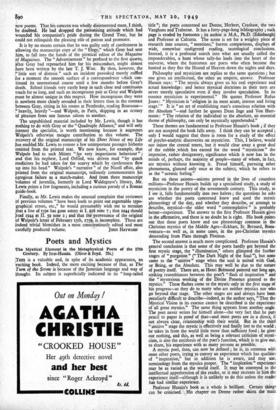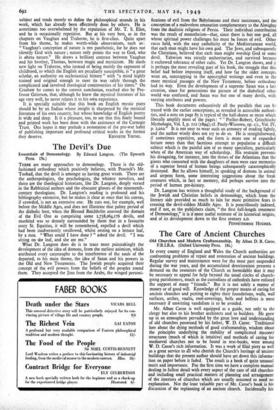Poets and Mystics
The Mystical Element in the Metaphysical Poets of the 17th Century. By Itrat-Husain. (Oliver & Boyd. 25s.)
Tins is a valuable and, in spite of its academic appearance, an exciting book. Indeed, the more exciting because of that, as The Turn of the Screw is because of the Jamesian language and way of thought. Its subject is superficially indicated in its "long-tailed
title "; the poets concerned are Donne, Herbert, Crashaw, the two Vaughans and Traherne. It has a forty-page-long bibliography ; each page is eroded by footnotes • its author is M.A., Ph.D. (Edinburgh) and Professor at Calcutta. The scene is set for a weighty piece of research into sources, "mentions," barren comparisons, displays of wide, somewhat undigested reading, tautological conclusions. Instead, it is a profound search into what are usually called the imponderables, a hunt whose tally-ho leads into the heart of the universe, where the huntsmen are poets who often become the hunted as they flee the Hound of Heaven down the nights and days.
Philosophy and mysticism are replies to the same questions • but one gives an intellectual, the other an empiric, answer. Professor Husain says : "The mystic always gives us his real experience and actual knowledge: and hence mystical doctrines in their turn are never merely speculative even if they involve speculation. In its essence mysticism is experimental." He quotes Professor Rufus Jones: "Mysticism is 'religion in its most acute, intense and living stage.'" It is "an art of establishing man's conscious relation with the Absolute "—and further he quotes Dean Inge and Von Hart- mann: "The relation of the individual to the absolute an essential theme of philosophy, can only be mystically apprehended."
These themes are fundamental to Professor Husain's book ; if they are not accepted the book falls away. I think they can be accepted ; only I would suggest that there is room for a study of the effect of psycho-analytic discoveries on mysticism. This, I believe, would not injure the central tenets, but it would clear away a great deal of the rubble ,which has earned for the word " mysticism " the imprecise, rather denigratory, significance which it now has in the minds of, perhaps, the majority of people—many of whom, in fact, are mystics without knowing it. Freud himself, pursuing other phenomena, glanced only once at the subject, which he refers to as the "oceanic feeling."
But on these axioms—axioms proved in the lives of countless millions—Professor Husain builds up a specialised study, a study of mysticism in the poetry of the seventeenth century. This study, as I see it, falls fundamentally into two halves ; the questions he asks are whether the poets concerned knew and used the mystic phraseology of the day, and whether they describe, or attempt to describe, mystical—the older word " contemplative " is probably better—experience. The answer to the first Professor Husain gives in the affirmative, and there is no doubt he is right. His book points out that these poets know and use phraseology common in the Christian mystics of the Middle Ages—Eckhart, St. Bernard, Bona- ventura—as well as, in some cases, in the pre-Christian mystics descending from Plato through Plotinus.
The second answer is much more complicated. Professor Husain's general conclusion is that some of the poets hardly got beyond the first mystic stage, the "illumination," others glimpsed the further stages of "purgation" (" The Dark Night of the Soul"), but none came to the " unitive " stage when the soul is united with God, or Being, or the Absolute. This may well be due to the nature of poetry itself. There are, as Henri Bremond pointed out long ago, striking resemblances between the poet"s "flash of inspiration" and the "mysterious working of the Divine Presence granted to the mystics." These flashes come to the mystic only in the first stage of his progress—as they do to many who are neither mystics nor who go beyond that stage. The other stages are and always have been peculiarly difficult to describe—indeed, as the author says, "That the Mystical Vision in its essence cannot be described is the experience of all great mystics." The same thing appears from another angle. The poet never writes for himself alone—the very fact that he puts pencil to paper is proof of that—and most poets are in a direct, if not always clear, relationship with their world. But in the third " unitive " stage the mystic is effectively and finally lost to the world ; he takes in from the world little more than sufficient food ; he gives out nothing, and this, as well as being a relevant criticism of mysti- cism, is also the antithesis of the poet's function, which is to give out, to share, his experience with as many persons as possible. A mystic poet, then, can now be defined ; he is, in common with most other poets, trying to convey an experience which has qualities of "inspiration," but in addition he is aware, and may use, terminology from the mystics proper. The "inspiration" experience may be as varied as the world itself. It may be conveyed to the intellectual apprehension of the reader, or it may recreate in him the experience itself—although it is unlikely to do this unless the reader has had similar experience.
Professor Husain's book as a whole is brilliant. Certain things can be criticised. , His chapter on Donne rather skirts the main
subject and tends merely to define the philosophical strands in his work, which has already been effectively done by others. He is sometimes too overwhelmed by the reputation of Mr. T. S. Eliot, and he is occasionally repetitive. But at his very best, as in the chapters on Vaughan and Traherne, he is first-class. Quite apart from his theme, he makes worth-while observations, such as : " Vaughan's conception of nature is not pantheistic, for he does not identify God with nature ; nature only points the way to God, who is above nature." He draws a brilliant contrast between Vaughan and his brother, Thomas, between magic and mysticism. He sheds new light on Traherne, who instead of being merely the exponent of childhood, to which the English are peculiarly susceptible, is "a great scholar, an authority on ecclesiastical history" with "a mind highly trained and original enough to steer its way safely through the complicated and involved theological controversies of his times." On Crashaw he comes to the correct conclusion, reached also by Pro- fessor Grierson, that, although he knew the mystical literature of his age very well, he never relates it to his own experience.
It is specially suitable that this book on English mystic poets should be by an Indian whose insight is sharpened by the mystical literature of his own country, but whose knowledge of English poetry is wide and deep. It ii a pleasure, too, to see that this finely bound and printed work has been done with the assistance of the Carnegie Trust. One hopes it may prelude a restoration of the pre-war habit of publishing important and profound critical works in the format











































 Previous page
Previous page